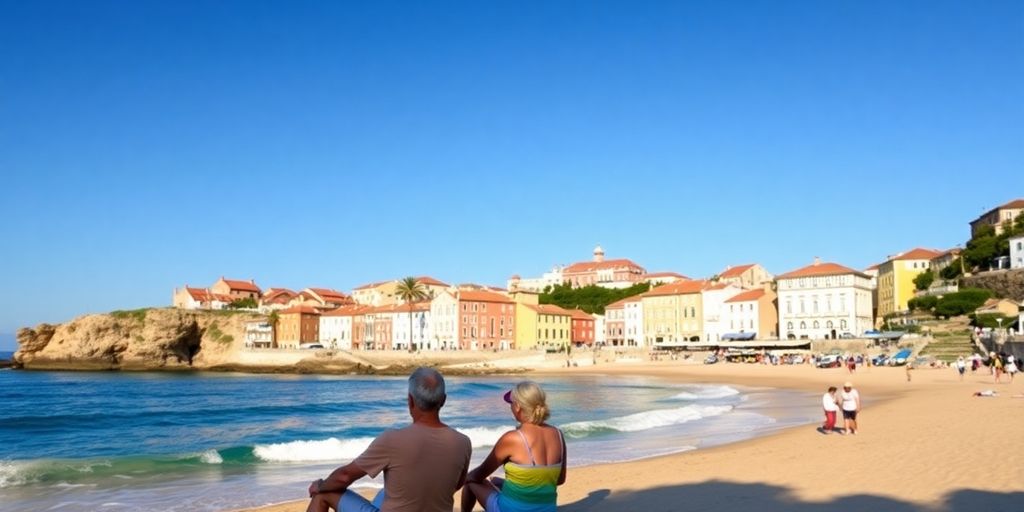
Exploring Tax Benefits for Retirees in Portugal: A Comprehensive Guide for 2025
Thinking about retiring in Portugal in 2025? You’re not alone. Many retirees are drawn to this beautiful country for its warm climate, rich culture, and affordable living. But there’s more to it than just the scenery. Portugal offers some great tax benefits for retirees, making it an even more attractive option. This guide will walk you through everything you need to know about taxes, healthcare, living costs, and more, so you can make the best decision for your retirement. Additionally, understanding the legal requirements and residency options is essential for a smooth transition to life in Portugal. To help you navigate this process, we’ve compiled crucial tips for retiring in Portugal, covering everything from the best regions to settle in to practical advice on moving your savings abroad. With the right information at your fingertips, you can ensure that your retirement in this stunning locale is as enjoyable and stress-free as possible.
Key Takeaways
- Portugal has a Non-Habitual Residence Program that can reduce taxes on pensions for up to 10 years.
- Double taxation agreements with many countries help retirees avoid being taxed twice on the same income.
- Property taxes in Portugal are relatively low, making it easier for retirees to purchase homes.
- Access to both public and private healthcare ensures retirees receive quality medical services.
- The cost of living in Portugal is generally lower compared to many Western European countries, making it affordable for retirees.
Tax Incentives for Retirees in Portugal
So, you’re thinking about retiring in Portugal? Smart move! One of the biggest draws is the potential tax savings. Let’s break down the key incentives you should know about.
Understanding the Non-Habitual Residence Program
The Non-Habitual Residence (NHR) program is a big deal. It can seriously cut down on your tax burden for the first ten years of residency. Basically, if you qualify, you could get major tax breaks on income from abroad. This includes things like pensions, dividends, and even some capital gains. It’s not automatic, though. You have to meet specific criteria, like not having been a tax resident in Portugal for the previous five years. Definitely worth looking into!
Double Taxation Agreements Explained
Portugal has agreements with a bunch of countries to prevent you from being taxed twice on the same income. This is super important if you’re getting income from your home country, like a pension or social security. These double tax treaties make sure you’re not paying taxes on the same money in both Portugal and your country of origin. It’s a bit complex, so getting advice from a tax professional is a good idea. They can help you figure out how these agreements apply to your specific situation.
Property Tax Benefits for Retirees
Property taxes in Portugal are generally pretty reasonable, which is a nice bonus. Plus, there might be some additional benefits specifically for retirees, depending on the municipality. For example, some areas offer discounts or exemptions for older residents. Owning property can be a great investment, and the lower taxes make it even more appealing. Just be sure to do your homework and understand the local rules before you buy.
It’s important to remember that tax laws can change, so always get up-to-date advice from a qualified professional. Don’t rely solely on information you find online. A good tax advisor can help you make the most of the available incentives and avoid any potential pitfalls.
Navigating the Tax System in Portugal

Declaring Worldwide Income
Okay, so you’re thinking about Portugal. That’s awesome! But let’s talk taxes. When you become a tax resident, Portugal wants to know about all your income, no matter where it comes from. This includes pensions, investments, rental income, and anything else you’re earning globally. It’s not just about what you make inside Portugal.
Here’s a quick rundown:
- Figure out if you’re considered a tax resident (more on that later).
- Gather all your income statements from everywhere.
- Report everything accurately on your Portuguese tax return.
It sounds scary, but Portugal has double taxation treaties with many countries. These agreements are designed to prevent you from paying taxes twice on the same income. Check if your home country has a treaty with Portugal – it could save you a lot of money and headaches.
Obtaining a Tax Identification Number
First things first: you absolutely need a Tax Identification Number, or NIF (Número de Identificação Fiscal). Think of it as your social security number for Portugal. You can’t really do anything official without it – open a bank account, sign a lease, get utilities, nothing. It’s pretty easy to get. You’ll need to visit the local tax office (Autoridade Tributária e Aduaneira) or, better yet, have a representative do it for you. Make sure you bring your passport and proof of address.
Understanding Tax Residency Requirements
Tax residency is key. You’re generally considered a tax resident if:
- You spend more than 183 days in Portugal in a year.
- You have a home in Portugal that suggests you intend to live there permanently.
- You’re part of the crew of a Portuguese ship or aircraft.
If you meet any of these, you’re in. Being a tax resident means you’re taxed on your worldwide income, but it also opens you up to certain benefits, like the Non-Habitual Resident (NHR) status. It’s worth looking into tax schemes in Portugal to see if you qualify.
Healthcare Benefits for Retirees
Okay, so healthcare is a big deal when you’re thinking about retiring anywhere, right? Portugal has a pretty good system, and it’s worth looking into. It’s not perfect, but it’s generally considered solid, and you have options.
Access to Public and Private Healthcare
Portugal has a universal healthcare system, which is cool. Basically, if you’re a legal resident, you can access public healthcare. It’s not always super speedy, but it’s there. The public system is generally accessible at a very low cost.
Now, a lot of retirees also go for private health insurance. Why? Well, shorter wait times, more specialized care sometimes, and just generally more flexibility. Plus, many doctors, especially in private hospitals, speak English, which is a huge plus if your Portuguese isn’t great. You can explore different neighborhoods to find medical facilities that suit your needs.
Cost of Health Insurance
Private health insurance in Portugal? It’s not crazy expensive. I mean, it depends on your age, any pre-existing conditions, and what kind of coverage you want, but you can often find decent plans for around €40 to €100 a month. Of course, that’s just a general range, so shop around. It’s a good idea to get quotes from a few different providers to see what works best for your budget and health needs. It’s way more affordable than what you might be used to, especially if you’re coming from the States.
Quality of Medical Services
Portugal’s healthcare system is actually pretty well-regarded. They’ve got modern facilities, well-trained doctors, and the whole deal. The World Health Organization ranked Portugal’s healthcare system pretty high, so that says something. Plus, if you have any chronic conditions or need long-term care, they have options for that too, like nursing homes and assisted living facilities. The public healthcare system offers affordable services, but private insurance is available for quicker access.
It’s worth noting that while the quality is generally good, it can vary depending on where you are in Portugal. Big cities like Lisbon and Porto will likely have more specialized services and facilities than smaller towns. So, keep that in mind when you’re deciding where to settle down.
Cost of Living Considerations
Moving to a new country involves understanding the financial implications. Portugal generally offers a lower cost of living compared to many other Western European nations and North America. Let’s break down what you can expect.
Housing and Rental Costs
Finding a place to live is a big part of your budget. Rental costs in Portugal are significantly lower than in the US or UK. You’ll find that prices vary depending on the location. Lisbon and the Algarve tend to be pricier, while smaller towns and rural areas offer more affordable options. For example, a one-bedroom apartment in Lisbon might cost you around €1,200 per month, while the same apartment in a smaller city could be half that price. Buying property is also an option, and while prices have been rising, they are still competitive compared to other European countries.
Everyday Expenses
Beyond housing, everyday expenses play a crucial role in your budget. Groceries, transportation, dining out, and entertainment all contribute to your monthly spending. The good news is that these expenses are generally quite reasonable in Portugal. A cup of coffee might cost you around €1, a meal at a local restaurant could be around €12-15, and a monthly transportation pass is often under €50. These savings can really add up, allowing you to enjoy a comfortable lifestyle without breaking the bank. Affordable living is one of the main reasons Portugal attracts retirees.
Here’s a quick look at some average costs:
| Item | Average Cost (€) |
|---|---|
| Coffee | 1.00 |
| Meal at a Restaurant | 12.00 – 15.00 |
| Monthly Transport Pass | 40.00 |
| Bottle of Wine | 4.00 |
Budgeting for Retirement
Creating a realistic budget is essential for a smooth transition to retirement in Portugal. Consider all your income sources, including pensions, social security, and any other investments. Then, estimate your expenses, including housing, healthcare, food, transportation, and entertainment. Don’t forget to factor in potential unexpected costs. Many retirees find that they can live comfortably on €1,300-€1,700 per month, but this will depend on your individual lifestyle and spending habits. Portugal’s tax incentives can also help you stretch your retirement income further.
It’s a good idea to spend some time in Portugal before making a permanent move. This will give you a chance to experience the cost of living firsthand and get a better sense of what your budget will look like. Talk to other expats, visit different regions, and explore your options before making any major decisions.
Here are some tips for budgeting:
- Track your spending for a few months to get a clear picture of where your money is going.
- Set realistic spending limits for each category of your budget.
- Look for ways to save money, such as cooking at home more often or taking advantage of free activities.
- Review your budget regularly and make adjustments as needed.
Cultural and Lifestyle Advantages

Community and Social Integration
Moving to a new country can be daunting, but Portugal makes it easy to connect with others. The Portuguese are known for their hospitality, and you’ll find many expat communities ready to welcome you. Don’t be afraid to strike up conversations at local cafes or join social groups. It’s a great way to make friends and feel at home. Plus, many Portuguese speak English, which helps a lot when you’re first settling in. It’s all about putting yourself out there and embracing the local culture.
Exploring Portugal’s Rich Heritage
Portugal is steeped in history, and there’s so much to discover. From ancient castles to stunning cathedrals, every corner has a story to tell. You can spend your days exploring historic sites, wandering through charming villages, and immersing yourself in the local traditions. The country’s rich heritage and slower pace of life will be mind-blowing for you in your golden years. Here are a few ideas to get you started:
- Visit the Jerónimos Monastery in Lisbon.
- Explore the medieval town of Óbidos.
- Take a boat trip along the Douro River.
Portugal is a treasure trove of cultural experiences. From museums to galleries, festivals to concerts, there’s a rich cultural scene that retirees can immerse themselves in. Experience the soul-stirring UNESCO-recognized musical genre, fado, which embodies the spirit of Portugal.
Enjoying the Mediterranean Climate
One of the biggest draws of Portugal is its amazing climate. With mild winters and long, sunny summers, it’s the perfect place to enjoy the outdoors year-round. Whether you’re strolling along the beach, hiking in the mountains, or simply relaxing in a cafe, the weather is sure to put a smile on your face. The fantastic weather is definitely a plus. You can enjoy outdoor activities like golf, swimming, and cycling. Plus, the sunshine is great for your health and well-being. If you are looking for retirement living with a good climate, Portugal is the place to go. The clean air and green initiatives further enhance a healthier lifestyle, contributing to both physical and mental well-being.
Planning Your Move to Portugal
So, you’re seriously thinking about making the big move? Awesome! Getting ready to relocate to Portugal takes some planning, but it’s totally doable. Let’s break down some key things you’ll need to consider to make your transition as smooth as possible.
Visa Options for Retirees
Okay, first things first: visas. You’ve got a couple of main options here. The D7 visa is popular, especially if you have a passive income source, like a pension or investments. It shows you can support yourself financially without working in Portugal. Then there’s the Golden Visa, which involves making a qualifying investment, often in real estate. Each has its own requirements, so do your homework. It might be worth talking to an immigration lawyer to figure out which one is the best fit for your situation. They can really help with the paperwork and make sure you’re following all the rules.
Legal Requirements for Residency
Alright, let’s talk about the legal stuff. Getting residency isn’t just about having a visa; there are other things you need to take care of. You’ll need a Portuguese tax identification number (NIF), which is essential for pretty much everything, from opening a bank account to signing a lease. You’ll also need to show proof of address, which can be a rental agreement or property deed. Make sure you understand the residency requirements, like how long you need to stay in Portugal each year to maintain your status. It’s a good idea to get all your documents in order well in advance to avoid any last-minute headaches.
Tips for a Smooth Transition
Okay, here are some random tips that can make your move way easier:
- Start learning Portuguese: Even if a lot of people speak English, knowing some Portuguese will make your life so much easier and help you connect with the local culture.
- Find a place to live: Whether you’re renting or buying, start your search early. Popular areas can get competitive, so give yourself plenty of time to find the right spot. Consider popular regions for retirees to get a sense of where you might want to settle down.
- Set up a bank account: You’ll need a local bank account for paying bills and managing your finances. Research different banks and find one that meets your needs.
Don’t underestimate the power of connecting with other expats. There are tons of online groups and communities where you can ask questions, get advice, and meet people who are going through the same thing. It can make a huge difference in how quickly you feel settled and at home.
Retirement Communities and Locations
Popular Regions for Retirees
So, you’re thinking about where to settle down in Portugal? Good choice! Portugal has become a hot spot for retirees, and for good reason. Let’s talk about some popular spots. The Algarve is probably the most well-known, especially among English speakers. It’s got that classic vacation vibe with amazing beaches and cute fishing towns. Plus, there’s a big expat community, so you won’t feel totally lost. If you’re into golf or water sports, this might be your place. It’s also easier on the wallet compared to other coastal spots in Europe.
Lisbon is another option, especially if you’re a city person. It’s got history, culture, and all the modern stuff you need. Think museums, fancy restaurants, and a cool arts scene. You can walk around pretty easily, and the public transportation is decent. Basically, it’s a good mix of old and new.
Portugal offers retirees an unmatched blend of safety, culture, affordability, and community. It is definitely a country to go to if you seek easy integration and building meaningful connections.
Amenities and Services Available
Okay, so what can you actually expect in these retirement spots? Well, in the Algarve, you’ll find plenty of golf courses, marinas, and walking trails. There are also lots of restaurants and bars catering to tourists and expats, so you’ll have plenty of options for eating out. Healthcare is generally good, with both public and private options available. You’ll also find plenty of services aimed at expats, like English-speaking doctors and lawyers.
In Lisbon, you’ve got all the city amenities you could want. World-class healthcare, shopping, cultural events – you name it. Public transportation is pretty good, so getting around is usually not a problem. You’ll also find a wide range of services, from home healthcare to language classes.
Choosing the Right Neighborhood
This is where things get personal. What kind of vibe are you after? In the Algarve, places like Lagos and Tavira are popular for their beaches and relaxed atmosphere. If you want something a bit more lively, Albufeira might be a better fit.
In Lisbon, each neighborhood has its own character. Alfama is the old historic district, full of narrow streets and traditional Fado music. Baixa is the downtown area, with shops and restaurants. And then there’s Chiado, which is known for its theaters and bookstores. Think about what’s important to you – do you want to be near the beach, in the heart of the city, or in a quiet residential area?
Here’s a quick guide:
- Proximity to amenities: How close are you to shops, restaurants, and healthcare?
- Transportation: Can you get around easily without a car?
- Community: Do you want to be in an area with lots of other expats, or do you prefer a more local feel?
Final Thoughts on Retiring in Portugal
In conclusion, retiring in Portugal in 2025 can be a fantastic choice for many. The blend of affordable living, stunning scenery, and a welcoming atmosphere makes it a top pick for retirees. With the added benefits of favorable tax policies and a solid healthcare system, it’s clear why so many people are considering this beautiful country for their golden years. If you’re thinking about making the move, take your time to plan and gather all the necessary information. Portugal could be the perfect place to enjoy a fulfilling retirement. As you research the best places to retire in Portugal, you’ll discover charming towns and vibrant cities that cater to various lifestyles. From the tranquil Algarve coast to the culturally rich city of Lisbon, each location offers unique attractions to enhance your retirement experience. Embracing the local culture, cuisine, and community activities can significantly enrich your daily life, making your retirement in Portugal not just a decision, but a wonderful adventure.
Frequently Asked Questions
What are the tax benefits for retirees in Portugal?
Retirees in Portugal can enjoy several tax benefits, including the Non-Habitual Residence program, which can significantly lower taxes on pensions and other income for up to 10 years.
Do I need to pay taxes on my pension if I retire in Portugal?
Yes, as a tax resident in Portugal, you will need to declare your worldwide income, including your pension. However, double taxation agreements may help reduce what you owe.
How can I access healthcare as a retiree in Portugal?
Retirees have access to both public and private healthcare in Portugal. Many doctors speak English, and health insurance is quite affordable.
What is the cost of living like in Portugal for retirees?
The cost of living in Portugal is generally lower than in many Western countries, making it an attractive option for retirees looking for affordability.
What are the best places to retire in Portugal?
Popular regions for retirees include the Algarve for its beaches, Lisbon for its culture, and Porto for its charm. Each area offers unique benefits.
What do I need to do to move to Portugal as a retiree?
To move to Portugal, you’ll need to apply for a visa, understand residency requirements, and gather necessary documents. It’s wise to seek help from a professional to make the process easier.



